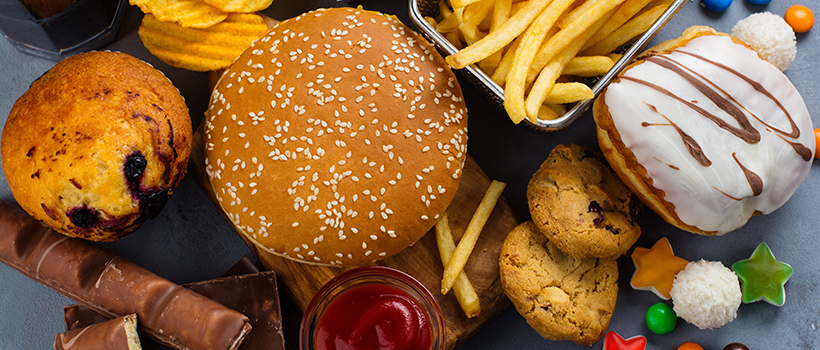
Promotional restrictions in the UK for products that are high in fat, sugar and salt (HFSS)
7 January 2026 | Lewis Wallis, Regulatory and Nutrition Affairs Advisor, Sharon Morey, Regulatory Affairs Manager, and Rachel Rosin, Product Prototyping Team Lead
A series of restrictions on the promotion of foods that are high in fat, sugar and salt (HFSS) came into force in part in England in October 2022. The Food (Promotion and Placement) (England) Regulations 2021 are intended to encourage food and drink businesses to produce and promote healthier foods and lifestyles. Further restrictions are due to be enforced in the coming year and the other devolved UK nations are planning to implement similar measures.
What is a HFSS product?
Currently, impacted food and drink categories are listed in the legislation and include, for example, soft drinks, savoury snacks, confectionery and pizza. Future implemented restrictions may expand the categories in scope, and so it is important to keep up to date with any regulatory developments. However, this does not mean every product within each category is impacted. Each is rated on an individual product level by a ‘Nutrient Profiling Model’ score which attributes negative points for calorie density, saturated fat, sugar and sodium, and positive points for protein, fibre, fruit, vegetables and nuts. Foods that score four or more and drinks that score one or more are categorised as HFSS products. Although the legislation is in place restricting specified promotions, customers may still require the HFSS score for your product as part of their company policy.
The regulations affect retailers, manufacturers and food business operators selling their food and drink products. Brands are responsible for providing accurate information about the nutritional profile of their products to sellers.
How is the promotion and placement of HFSS products restricted?
The legislation currently restricts the placement of certain HFSS products in prominent locations both in-store and online. HFSS products are no longer eligible for placement in ‘impulse’ areas such as checkouts or gondola ends and their online equivalents. Some exemptions do apply to specific stores including those smaller than 185.8 square metres (2,000 square feet), speciality food stores that sell one type of product, such as chocolate and for businesses with less than 50 employees. The onus will be placed on the retailer to comply with the regulations.
The date of entry into force of provisions in the legislation preventing HFSS products from appearing in specified volume promotions (e.g. multibuy: ‘2 for 1’ or extra-free: ‘20% extra-free) and HFSS drinks from using free refill offers, has been delayed until 1 October 2025.
The current legislation is only applicable in England, but the other devolved UK nations are in the process of developing their own rules. The Food (Promotion and Presentation) (Wales) Regulations 2025 were published and state that the HFSS restrictions in Wales will enter into force on 26 March 2026. The proposals are mostly aligned with the restrictions in England and will apply to the same product categories.
In Scotland, a consultation response was published in June 2025 confirming the intention that restrictions in Scotland will align with policy in England and Wales. The Food (Promotion and Placement) (Scotland) Regulations 2025 published in October confirmed the date of implementation to be 1 October 2026.
How will TV and online advertisements of HFSS products be restricted?
Further UK-wide advertising restrictions are planned to be implemented that will prevent HFSS products from appearing in TV advertisements before 9pm and in all paid-for online advertisements. The implementation of these restrictions has also been pushed back and are now due to come into force in January 2026. However, in agreement with the Government, advertisers and broadcasters, with the support of online platforms and publishers, have made a clear and public commitment to comply with the restrictions as though they would still come into force from 1 October 2025.
The secondary legislation was published in December 2024 alongside new product categorisation guidance. It is important to consider that the TV/online restrictions extend to the categories in scope to include sandwiches and out-of-home main meal offerings. The consultation response included further clarity on definitions and exemptions, plus a targeted consultation on how the restrictions will apply to internet protocol television (IPTV) services which deliver television live over the internet. For IPTV services, the December consultation response confirmed that Ofcom-regulated IPTV services would be subject to the 9pm broadcast watershed rather than the 24-hour online restrictions. Unregulated IPTV services will continue to be subject to the online restrictions.
The Advertising Standards Authority (ASA) and Committee of Advertising Practice (CAP) published the final version of the guidance in December 2025. It states that the restrictions will only apply to advertisements that include a specific (e.g. single SKU code) identifiable (e.g. naming in text/audio/imagery) HFSS product. In response to The Advertising (Less Healthy Food and Drink) (Brand Advertising Exemption) Regulations 2025 the guidance clarifies that ‘brand advertisements’ are exempt from the restrictions.
These new rules will not replace the existing advertising codes of practice (CAP) rules that cover certain kinds of promotional communications, particularly when advertising products to children or which may be attractive to them. The new legislation places additional restrictions on specific categories of HFSS products however the current CAP rules still apply to all products regardless of whether they fall within an impacted food category.
What is the current timeline for implemented and upcoming HFSS restrictions?
Since 1 October 2022:
- • HFSS products restricted from appearing in prominent locations both in-store and online (England)
Since 1 October 2025:
- HFSS products restricted from appearing in volume (e.g. multibuy) promotions (England)
Since 5 January 2026:
- HFSS products restricted from appearing in TV advertising before 9pm (UK)
- HFSS products restricted from appearing in paid-for online advertising (UK)
From 26 March 2026:
- HFSS products restricted from appearing in prominent locations both in-store and online (Wales)
- HFSS products restricted from appearing in volume (e.g. multibuy) promotions (Wales)
From 1 October 2026:
- HFSS products restricted from appearing in prominent locations both in-store and online (Scotland)
- HFSS products restricted from appearing in volume (e.g. multibuy) promotions (Scotland)
Are there any other HFSS restrictions that businesses need to consider?
It is worth being aware that some councils are also implementing their own restrictions locally to prevent the promotion of products categorised as HFSS, such as advertisements displayed on council owned sites and public premises. Transport for London (TfL) also has an advertising policy that prevents the promotion of HFSS products on public transport in London.
How can businesses prepare for current and future HFSS restrictions?
In practical terms, the current and future restrictions mean that many brands may need to reformulate if they want to completely avoid any curbs on marketing activity. The way in which the HFSS scoring system has been set up deliberately prevents food companies from simply adding positive nutrition, such as protein or fibre, to balance the nutrients of public health concern. Manufacturers need to bring down the saturated fat, salt and sugar content first.
This presents several challenges because these elements contribute to important functional characteristics such as: taste, shelf-life, texture, stability, mouthfeel, handling, and production reliability and play a major role in our overall eating experience. Consequently, if consumers do not buy the reformulated product after tasting it, despite substantial promotional activity, achieving non-HFSS status may not be economically viable. That is why it is so important to optimise reformulation to ensure the characteristics and integrity of the original product as much as possible.
Our regulatory and reformulation support for your successful products
We understand the challenges associated with using less fat, sugar, and salt in recipes. Thanks to our extensive knowledge, experience and expertise, we can support our clients with product reformulation, evaluate the effects of potential changes on consumers acceptance and satisfaction and therefore help maximise profit.
Our unrivalled experience supports the food and drink industry to exceed its objectives in producing great tasting, high-quality, reduced-fat, reduced-sugar and reduced-salt products with an extended shelf-life, we aim to help companies create healthier and cost-effective products that meet consumer expectations.
Need advice on how HFSS restrictions could impact your business or help with calculating Nutrient Profiling Model scores for your products? Contact our Regulatory Affairs team, who can help with any HFSS regulatory requirements.
Does your business need help to reform your product and ensure it maintains the great taste and customer satisfaction? Contact us.

About Lewis Wallis
Lewis is a Regulatory and Nutrition Affairs Advisor in the Global Regulatory Affairs team at Campden BRI and has previous industry experience from working for a large multi-national company. He has contributed to and written material for a variety of outputs including research publications, technical reports, food law updates, blog articles, white papers, book chapters, eBooks and guidance documents. Lewis presents on Campden BRI courses and at a range of industry and academic events on the topics of High Fat Sugar Salt (HFSS) legislation, ultra-processed foods, and front-of-pack nutrition labelling.
He is a member of the IFST Food Regulatory Special Interest Group that work to host thought-provoking discussion workshops which feature experts presenting on the latest regulatory hot topics.
Alongside his current role, Lewis is a Postgraduate Researcher at University of Leeds and draws upon his regulatory expertise to conduct research at the intersection of food legislation and consumer behaviour, particularly focusing on measures designed to promote healthier and more sustainable food choices within digital food environments (e.g. online retail, meal delivery apps, social media). He has conducted research on the implementation of HFSS restrictions within online retail and his work involves the application of nutrient profiling models and processed food classification systems to products promoted and sold in digital settings.

About Sharon Morey
Sharon has worked here at Campden BRI since 2016, and also has a wealth of knowledge and experience from previous regulatory, technical and other roles.
Sharon studied Nutrition, and has previously worked at Quest NutraPharma (Regulatory Affairs Manager/ Nutritionist and Training Manager), BioCare Ltd (Technical and Customer Development Manager) and Holland & Barrett Ltd (Regulatory Affairs Officer/Retail Training Officer/ Customer Service Manager/Public Relations Officer).
Alongside supporting clients and projects within Regulatory Affairs, Sharon presents on scheduled and tailored training courses in all aspects of Food Law. She has also contributed to and written articles for nutritional and pharmaceutical trade and consumer publications.

About Rachel Rosin
Rachel has worked here at Campden BRI since 2009, initially as a packaging technologist, and joined the Product Innovation team in 2011. Rachel's responsibilities as Product Prototyping Team Lead include contract product development for a wide range of food and beverages as well as being involved in processing trials for clients within Campden BRI's pilot plant facilities.
Need advice?
Need advice on how the new HFSS legislation could impact your business?
How can we help you?
Does your business need help to reform your product and ensure it maintains the great taste and customer satisfaction?







